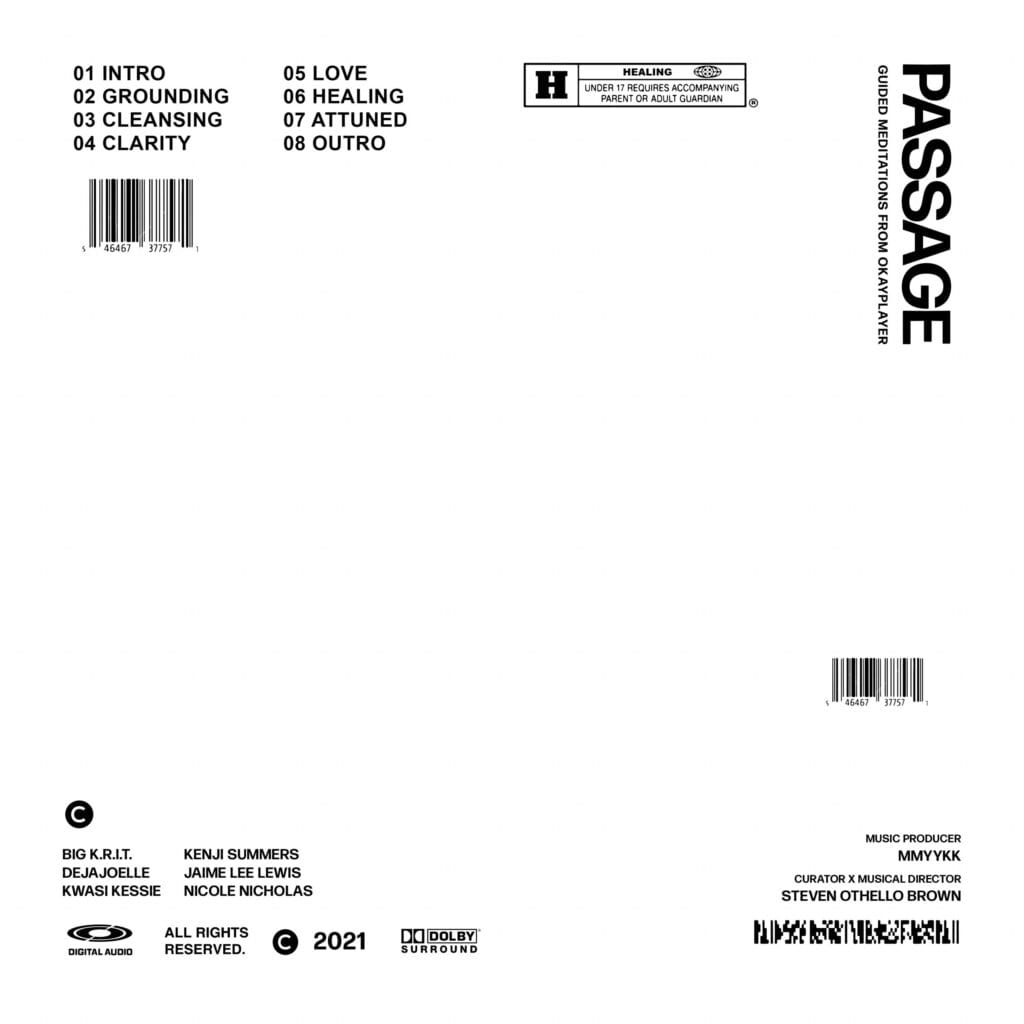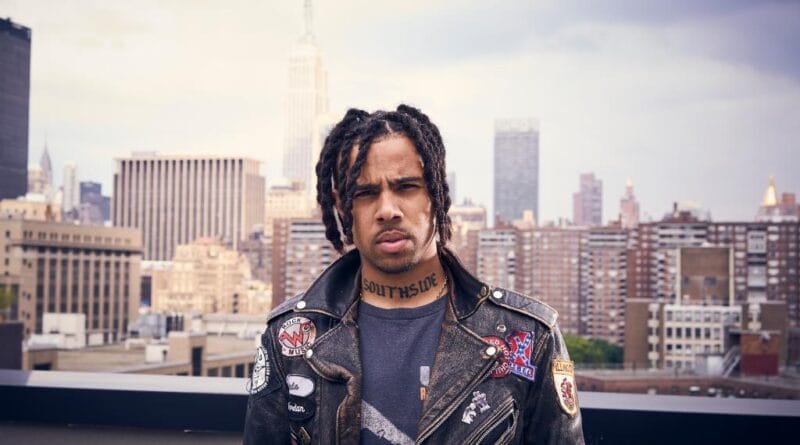Passage: The Practice of Healing – A Night of Healing With Vic Mensa and Okayplayer
Where do you turn while you watch your house burn? To answer this, I was blessed with an opportunity to sit in on the Passage livestream event on black healing with Rachel Hislop, VP of content/editor-in-chief of Okayplayer, and rapper Vic Mensa. Okayplayer is the news and culture site founded in 1998 by The Roots front-man Questlove, is rolling out an initiative to honor Black resilience called “PASSAGE: The Practice of Healing.”
Launched by editor in chief Rachel Hislop, the “love letter” to people of color seeks to act as a reprieve to a year inundated with a stream of racial violence and negative messages associated with identifying as BIPOC. Passage is an eight-track sonic journey paired with meditations by reputable black creators such as Big K.R.I.T, Kwasi Kessie, Kenji Summers, and others backed by the otherworldly soundscapes of MMYYKK. The EP is available across all major streaming platforms here.

Rachel and Vic held an intimate conversation dissecting his particular healing journey and how he’s evolved since making it a priority in his life. Vic Mensa has released “Shelter,” in collaboration with Wyclef Jean (of Fugees fame) and fellow Chicago-native Chance the Rapper. “It’s one of my favorite songs that I’ve ever made. It’s something that came together to express things that were on my spirit, on my chest. And when I wrote it, I felt like I had put that into the ether,” explains Mensa, who has been outspoken about gun violence in his work and this piece of art is no exception.
Excerpt from Shelter
Vic -You tell me not to move with my gun
But we got more funeral homes than schools where I’m from
And on the news, all you view is homicides
Tell me why it ain’t no trauma units when everybody traumatized? (Yeah, I)
Tryna get on your feet playing the hand they dealt ya
If your house is not a home, let this song be your shelter
The video is a beautiful exploration of the black experience in America but held within a cul de sac of a local community. It expands on the concept of being in a situation where things are falling apart around you and the need for true shelter even when the roof over your head is in flames.
At one point in the video, you see a series of bodies scattered upon the concrete with flowers placed upon the grave as a monument to the lives lost to COVID, with Vic explaining that “the flowers and the bodies and mounds, it was a depiction of COVID.” In the livestream, Vic expands further: “COVID was a microcosm for the way everything disproportionately affects Black people. So we wanted to express that.”
Passage serves to create a space for intergenerational Black healing that is primarily a labor of love and an underrated civic duty. Facing a global pandemic is taxing enough on the mind and body, we can all agree, but imagine being disproportionately affected by it due to the color of your skin. Not to mention, an issue that has existed for far too many years, the dehumanizing treatment of black and brown people by the hands of police and government.
“Passage is a celebration of resilience, positivity, healing, and a safe space created in support of millennials of color. We know what processing Black pain and trauma looks like, we are all too familiar with it. We have been inundated with a stream of negative messaging associated with identifying as a person of color in this country, while also fighting dual pandemics,” said Rachel Hislop, VP of content/editor-in-chief.

Before I carry on, I am aware I am light-skinned and in no way wish to claim the black experience as my own, despite my Afro-Puertorican roots. I have taken time to understand how my Black and brown ancestors came together through the diaspora and those events led to mixed people like myself. I, however, align myself with the fight for justice for my people and hope you as a reader will accept my opinions on this matter. I only mean to amplify the issues present and the methods we can take to heal from the tragic history of racism in America and beyond.
With the past year, we’ve had thus far, these have been trying times for all of us in many different ways. Now that humans are all facing this crisis together at varying degrees, there has been discourse regarding the “collective trauma” this global event has instilled in us. Collective trauma occurs when a group of people experiences psychological unraveling simultaneously as a result of a shared experience (i.e. The Great Depression or 9/11).
The idea of trauma is something that is more widely discussed in popular culture however there are many layers to what trauma means to each and every one of us. Now if you look beyond the trauma of the individual and approach it from a generational perspective, you’re adding on a whole new layer of complications. We can all agree that this virus has done a number to our mental health, which will help you understand the concept of transgenerational trauma.
During the livestream, Vic opened up about his experiences in the past with addiction and trauma, showing a level of wisdom that really resonated with me as a viewer. Vic spoke of discovering transcendental meditation and other similar practices during his journey into sobriety and how it helped heal him.
“Right now is the peace you are seeking,” states Mensa as he opens up about the pressures he faced growing up in a rough Chicago neighborhood. Vic expanded on the concept of the trauma he’s inherited through his identity, referencing how’d he’d catch his inner dialogue naturally reverting to fight or flight mode due to his upbringing in a violent climate that so many people from underserved communities can relate to. Within the culture, there’s a mishandling of frustrated energy that leads to violence and aggression against those of your own kin, due to the traumas we carry and the lack of access to resources to heal.
“We’re reflecting that same energy that we’ve taken in from the world around us. We’re hurting people that we really do love because we don’t know how to love.” How can people heal when there are no clear pictures of what love looks like? In the black experience, generations of people have been raised seeing negative images and stereotypes of black people which can be internalized and expressed in self-hatred and hatred for those who look like you.
We’re blessed to be living in a time where healing is possible and leaders like Okayplayer, Rachel Hislop, and the production team behind this Passage roll-out in order to create a narrative of positive change for the people, by the people.
Mensa frequents his native Ghana to reconnect with his ancestors and expresses gratitude for being privileged enough to have that direct access to the source. Witnessing a community in Ghana living peacefully without the typical entrapments of capitalism and excess and juxtaposing it against the stressful American lifestyle, you learn a lot about what’s truly important.
One line that Mensa stated in the interview was “How can you function in your skin if you don’t know your own bones?” Whew Chile, when I say I can’t stop thinking about this gem of a quote I’m not exaggerating. This idea basically expresses that if you don’t know yourself (your spirit, your history, where you come from) how can you tap into the source and heal properly?
A big thing that this pandemic has created is the stillness that we didn’t have in our fast-paced societies before. You’re now forced to sit and live with yourself in a way many people tend to avoid or lack time to pay attention to. “Recognizing that difficulty that I live with and experience — gives a certain power because you’ve existed in a certain depth that others haven’t swum to” Mensa explains that once you begin to practice meditation, you start to realize that you’re connected to everything.
I was lucky enough to get to answer a question to Rachel and Vic, which was:
How can someone create and foster a safe space to encourage these hard conversations? Especially with bringing mental heath and generational trauma into the conversation?
He answered: Show up for people, love on people, love on Black people, love on brown people. Some of the realest relationships are people that I can speak to about life. Those are the safest spaces for me. When we’re able to have a conversation in earnest with no agenda. You know, don’t just talk to me when there’s something going on, or when they need something. The safest spaces in conversation are when you’re speaking to people about their spirits and beyond the surface level things. In short, keep it real and authentic to allow others to feel safe in their expression.
To close up the livestream, Rachel and Vic discussed further the idea of meditation as a spiritual practice to connect to our ancestors: “As I learn more about different spiritual traditions, African spiritual traditions, priests especially – meditation is their sport.” The act of taking on this practice as a way to heal yourself and the history your body carries is an act of self-care and protection in a time where the world has its back turned on you. Transcending the collective trauma of black history and centering yourself as a black creative is a work that needs to be done in order to reframe the narrative of the black experience in America.
The Passage EP and content to follow are an innovative, modern way of providing this resource to Black millennials who may not know how to approach this heavy topic or what it means to be at peace. I’ve given it a listen and it’s a wonderful journey into soundscapes and affirmations that anyone would benefit from taking the time to practice. The EP is available across all major streaming platforms here.
This content rollout will also include wellness-focused audio/visual content, editorial programming, and an apparel collection championing self-care. Accompanying the Passage EP is the Short Film Visualizer, an interview series, monthly self-care sessions, Black business spotlights, and much more.
PASSAGE TRAILER: Directed by Andrew Morrow, the man behind some of Beyonce’s greatest visual works (Lemonade, Black Is King, Homecoming), the short-film evokes beautiful images of Black resilience such as celebrations of Black love with Martin Luther King Jr. and Coretta Scott King; resistance, with the Selma marches; spoken word from Maya Angelou, and more. Watch it here.
Below are links to mental health resources for you or anyone you know who may be struggling. :
MENTAL HEALTH RESOURCES: NQTTCN.COM SOULACEAPP.COM AYANATHERAPY.COM THERAPYFORLATINX.COM THERAPYFORQPOC.COM CLINICANSOFCOLOR.ORG THERAPYFORBLACKMEN.ORG THERAPYTHATLIBERATES.COM LOVELANDFOUNDATION.ORG ROOTTOCROWNHEALING.COM THERAPYFORBLACKGIRLS.COM
For more film, gaming, anime, and tv news, trailers, and updates make sure to keep it locked right here at The Nerdy Basement. And while you’re here, please consider supporting us on Patreon. It’s an easy way of supporting us so we can keep proving you with your Nerdy News!

